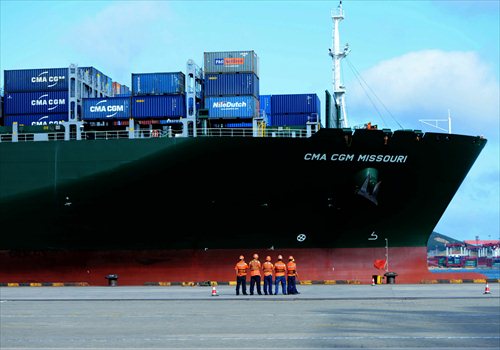HOME >> BUSINESS
China faces pressure to lift trade restrictions
By Wang Cong Source:Global Times Published: 2016/7/20 23:03:00
EU, US WTO cases on Chinese raw material exports could hurt domestic industry

Workers stand by a cargo ship at a port in Qingdao, East China's Shandong Province, on July 8. Photo: IC
Two separate cases brought by the European Union and the US to the WTO challenging China's restrictions on exports of certain raw materials could hurt the domestic industry and undermine China's efforts in environmental and resource preservation, analysts noted on Wednesday.
The cases, which allege that China's duties and quotas on the export of some raw materials are against the WTO rules and harmful to industries in the EU and the US, are examples of contradictory stances the two powers have continuously taken on trade disputes and fair international trade practices, according to analysts.
The EU on Tuesday launched a third case against China's restrictions on the exports of 11 raw materials that are deemed essential for European industries, the European Commission, EU's executive body, announced in a press release.
The raw materials include graphite, cobalt, copper, lead, chromium, magnesia and talcum, according to the EU press release.
The EU contends that export restrictions, including export duties and export quotas, "have distorted the market and favored Chinese industry at the expense of companies and consumers in the EU, in violation of general WTO rules."
On the same day, US Trade Representative Michael Froman said that the US has expanded its previously announced challenge at the WTO against China's export restraints on nine key raw materials to 11, according to a press release on Tuesday.
The Chinese government rejected the EU and US challenges, with the Ministry of Commerce saying China's export restrictions on the raw materials are intended to protect resources and the environment, and are in line with the WTO rules, according to two separate statements from the ministry.
Though proceedings in the cases, which include initial consultations between the parties, could take some time to complete, it is not good news for the Chinese nonferrous metals industry, analysts said.
"Following the news, on-spot prices of some nonferrous metals will face certain degree of downward pressure," Wu Chenhui, a Beijing-based independent industry analyst, told the Global Times.
Uncertainties surrounding export restrictions following the challenges will hurt the confidence of producers and traders, which in turn could lead to price fluctuations, according to Wu.
The nonferrous metals industry in China is already going through a rough phase with slowing production, dwindling exports and profit losses for companies, according to a report from the China Nonferrous Metal News, a Beijing-based industry newspaper, on July 11.
In the first five months of 2016, the year-on-year growth of production of 10 nonferrous metals has slowed to 0.3 percent, exports of nonferrous metals declined 21.5 percent year-on-year and losses for companies still high at 17.6 billion yuan, despite recent improvements, according to the report.
The cases also expose the double standards adopted by the EU and the US and the deeper problems within the current international trading system, analysts said.
"The cases are simply baseless and not in conformity with the WTO rules," Wu said. "To bring cases against China's restrictive measures on raw materials, you first have to determine if China is a large producer of these materials. And at least in two cases, cobalt and copper, China is not the main producer. In fact, we rely on imports of these two materials."
These issues are just examples of developed economies like the EU and the US interpreting WTO rules the way it favors them, according to Jiang Yong, a research fellow at the China Institutes of Contemporary International Relations.
"When the rules are not in their favor, they ignore them," Jiang told the Global Times on Tuesday. "For example, both the EU and the US have imposed import restrictions on some Chinese products, like tires and steel, on the pretext of anti-dumping ."
Almost all trade disputes have resulted in export or import duties and quotas, which is not in line with the WTO rules, according to Jiang.
"The larger problem is the ineffectiveness and ambiguity of some WTO rules, which tend to give more power to developed economies, and China should work toward changing that," Jiang said.
Posted in: Companies